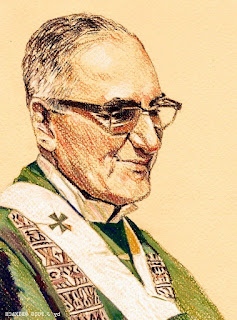Religion and politics. What’s a Catholic citizen to do?
From the days when Father Power preached from this pulpit to today it is a thorny and a challenging problem, ever calling us back to the pure proclamation of the Gospel in a world beset by really confusing political, social and economic realities. It can be a mess.
One thing is certain, we can never stop proclaiming the Gospel, in season and out. Whether it be the right to Life, the dignity of the poor and the immigrant, Religious Liberty or the integrity of the Seal of Confession, the Church has a right and responsibility to preach the Gospel.
But none of this is politics. It is proclaiming the Gospel, in every political and economic setting. I’m a priest. Party, politics and economic systems are not my bailiwick. I preach Christ Jesus and him crucified and risen, and it is his Gospel and his Church for which I would lay down my life.
So why talk about this now? Because Bishop McManus has invited Cardinal Chavez to celebrate the noontime Mass tomorrow. His Eminence is an old friend and collaborator of Saint Oscar Romero, who was killed by government agents for defending the rights of the Church and her poor in El Salvador.
In Latin America of the 1960’s, not a few sons and daughters of he Church argued that the ordained and religious should preach an overthrow of unjust structures and organize political resistance to unjust political structures. For some, this meant working for the election of this group or that, while for many others, it meant preaching very particular socio-economic gospels, most of them based on Marxist political theory.
Such was the state of affairs in El Salvador, a country governed by terror and oppression, Archbishop Oscar Romero was appointed Archbishop of San Salvador. A deeply spiritual priest of Opus Dei, he was not known for his political views. And so many of the more radicalized priests feared Romero’s more traditional style would compromise their advocacy for the poor and the oppressed.
It’s a long story from there, but they were very wrong. Indeed, Archbishop Romero’s radio homilies on Sunday nights were listened to by three quarters of the citizens of El Salvador, as he spoke against injustice, defended the poor and the oppressed and insisted on respect for the rights of the Church.
Notice he never advocated a particular political ideology and never associated himself with a particular party. Such a path would, in the words of our beloved Pope emeritus, lead only to “rebellion, division, dissent, offence and anarchy.” Romero chose to preach Christ crucified more than Marx redefined, seeking not the victory of political ideologies, but the saving of souls.
Indeed, while no one was more relentless in fighting against the oppression of the poor and the persecution of the Church, no one was ever as clear that he was seeking neither temporal or political victory. For the Church, Romero insisted, is not about the reform of governmental structures, but the conversion of human hearts.
Archbishop Romero was killed for preaching that Gospel. Literally shot to death while saying Mass in a hospital for the terminally ill. He finished his sermon, stepped away from the lectern, and took a few steps to the altar as a man with a gun emerged from a car in front of the chapel. He shot him in the heart.
As many as fifty people were shot to death outside the Cathedral the day Saint Oscar Romero was buried and the civil war in El Salvador was to drag on for years to come.
So what are we to we do in the face of immoral government leaders, who ignore the rule of law and persecute the poor? Each and every citizen has the right and the responsibility to take a full and active role in political life and to seek to apply the moral mandates of the Gospel to our civic structures, preserving the rights of every citizen to life, liberty and the pursuit of happiness.
But the Church does not accomplish this task by our advocacy of political parties or movements or by redacting or inventing new political ideologies.
I’m a priest, not a politician. And I am called, like Saint Romero, to preach the Gospel, which includes a defense of the poor, the unborn, the old, the stranger and the orphan. But, like Saint Oscar and Saint Paul, sitting in prison, chained like a criminal, I preach no earthly doctrine, but “Jesus Christ, raised from the dead,” and him alone.
And while the forces of this world may sometimes put us in chains, Saint Paul reminds us, “the word of God is never chained.” And we are called to “bear with everything” that we might lead every man or woman we ever meet to that salvation which is Christ Jesus, our Lord.
Saint Oscar Romero, pray for us.

